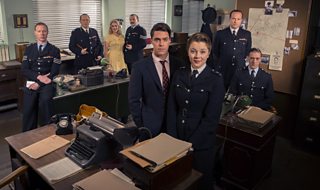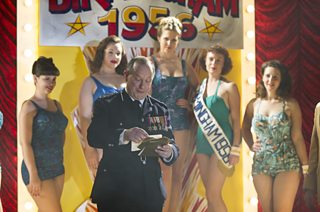Everything you need to know about Claudia Jessie – the new woman on the beat in WPC 56
Claudia Jessie
Actress
WPC 56, the drama about the first female police officers in 1950s Birmingham and the Black Country is back. And the force has a new policewoman in its ranks: Annie Taylor, played by actress Claudia Jessie.
As Annie takes up the badge left behind for her by WPC Gina Dawson, who has graduated to the Met, Claudia tells us seven things we need to know about herself and her character.
1. I watch everything I’m in with my mum.
I’m really excited for series three to start. I’ve been re-watching the second series in preparation – again! I’ll be watching it with my mum. Everything that I’m in, I watch with my mum. And then I’ll make my boyfriend watch it with me later on BBC iPlayer!
I hate any photographs of me, I’m not on Facebook or Twitter or anything like that - I hate seeing myself in a normal situation, me being me. But when I’m playing someone else it feels like I’m removed from it, so I don’t mind watching scenes I’m in too much.

WPC Annie Taylor is Birmingham's newest female police constable
2. Annie and I have a lot in common
Being the new girl ran parallel and it really helped me actually. There was me coming into a cast that had already established a great production and great characters, and meeting these lovely people as actors, and then Annie was going through the same thing wasn’t she? I think it was quite nice that I had that in common with my character.
Am I like Annie? I really bloody hope so! Because she’s lovely. I think Annie is probably a lot stronger emotionally than I am though – I don’t think I’d be able to do her job!
3. Annie has a lot of expectations to live up to
One of the first things she says to her peers is that she’s going to do her best to live up to the expectation of the hard work that Gina built. But I think the thing with Annie is, she just wants to do a really good job, and I think she would have done that even if she was the first WPC.
Her gender is obviously such a poignant thing in the show, but for Annie I don’t think that that’s even registered, I don’t think she necessarily feels led by her maternal side or her, um, womb! She’s led by justice really, and truth, and I think that’s really powerful.
4. I want to make Birmingham proud
I knew of WPC 56 anyway because I’m from Birmingham (I was born in Moseley) as are all my family and dear friends, so my family are really aware of it too – especially my nan! She was so pleased when I got the part. To represent Birmingham in a drama makes me feel really proud.
There’s nothing more wonderful than a Brummie! There’s this unassuming, almost apologetic nature – I mean we’ve been the butt of everyone’s jokes for decades! I have six uncles, and they’re all Brummies and they’ve got this great sense of humour, that ‘take it on the chin’ sort of humour that runs through the WPC 56 script. I think that humbleness to the characters is a real Birmingham trait. It definitely reflects Birmingham in the right light.

Coulson makes a surprise, and somewhat unwelcome return in episode one
5. I have such an appreciation for women in the 1950s
The show is set just on the back of World War Two at a time when women were doing all of the men’s jobs because they were away fighting. What I found amazing is that when the men came back – obviously I wasn’t there! – but it seemed men expected women to go back to what they were when the men were at home. Whereas actually they’d been working their socks off and had done a fantastic job.
It was a time of real social change and I remember talking to Dominique Moloney, the show’s writer, about that – you’ll get to see a lot of that with Annie and her mother and father. There are some really beautiful scenes with them all together and you really find out a deeper story and I’m sure it will touch a lot of people. When Assistant Chief Constable Coulson returns, knowing how he behaved in the last series and how he was towards Gina Dawson, Annie isn’t intimidated. She just thinks, OK I’ve kind of got a job to do. But I think there’s a bit of a revolt against him - spoiler alert - people really aren’t taking his stuff anymore towards the end of the show.
6. Parts of 1950s policing shocked me
Like all female police officers, Annie would never carry a weapon. I thought that was odd. There was a scene I did and I was just like: “Well Annie would just step straight forward”, but no, DI Harry Sawyer had the gun, so he goes first. Annie is the kind of look out. I thought wow, that’s bonkers. I don’t have a weapon but you all get truncheons?!
Although I did hold one of the guns, and it was used in World War Two, a real gun that was USED IN THE WAR. I remember holding it and being like ‘someone please take this out of my hands!’
7. I’m Buddhist
I’ve been practising Nichiren Buddhism for eight years now. In terms of me and my life in acting, I can safely say with no fear of contradiction that if I were not practising Buddhism I wouldn’t be an actress. I think it’s really supported my life, my sense of worth, and belief that I can create value in whatever I do.
Claudia Jessie plays WPC Annie Taylor in WPC 56.
WPC 56 returns on Monday, 9 March at 2.15pm on BBC One.
More on WPC 56
Writer Dominique Moloney on women in policing in the 1950s
Comments made by writers on the BBC TV blog are their own opinions and not necessarily those of the BBC.
